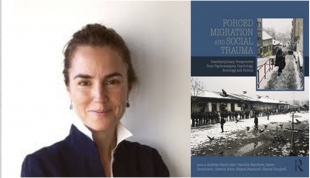
Book Co-edited by Saime Özçürümez Receives NAAP Gradiva Award
A book co-edited by Assoc. Prof. Saime Özçürümez of the Department of Political Science and Public Administration recently received an award from the US-based National Association for the Advancement of Psychoanalysis (NAAP). Titled “Forced Migration and Social Trauma: Interdisciplinary Perspectives From Psychoanalysis, Psychology, Sociology, and Politics” (Routledge, 2018), the volume was a recipient of the NAAP’s 2020 Gradiva Award for Best Edited Book.
The book is among the publications of the German Academic Exchange Service–funded project “Social Trauma in Changing Societies” Network led by the International Psychoanalytic University Berlin, in which Dr. Özçürümez has been a node leader since 2017. Other coeditors of the book were Andreas Hamburger, Camellia Hancheva, Carmen Scher, Biljana Stankovic, and Slavica Tantjevic.
Each year, the NAAP selects what it judges to be the best works among those published worldwide that deal with topics in the area of psychoanalysis and psychotherapy. The contributions in “Forced Migration and Social Trauma” have generated considerable interdisciplinary dialogue among researchers and policy practitioners regarding the impact and consequences of the trauma committed, perpetuated, and experienced in forced migration along the Balkan route.
The book is among the publications of the German Academic Exchange Service–funded project “Social Trauma in Changing Societies” Network led by the International Psychoanalytic University Berlin, in which Dr. Özçürümez has been a node leader since 2017. Other coeditors of the book were Andreas Hamburger, Camellia Hancheva, Carmen Scher, Biljana Stankovic, and Slavica Tantjevic.
Each year, the NAAP selects what it judges to be the best works among those published worldwide that deal with topics in the area of psychoanalysis and psychotherapy. The contributions in “Forced Migration and Social Trauma” have generated considerable interdisciplinary dialogue among researchers and policy practitioners regarding the impact and consequences of the trauma committed, perpetuated, and experienced in forced migration along the Balkan route.



